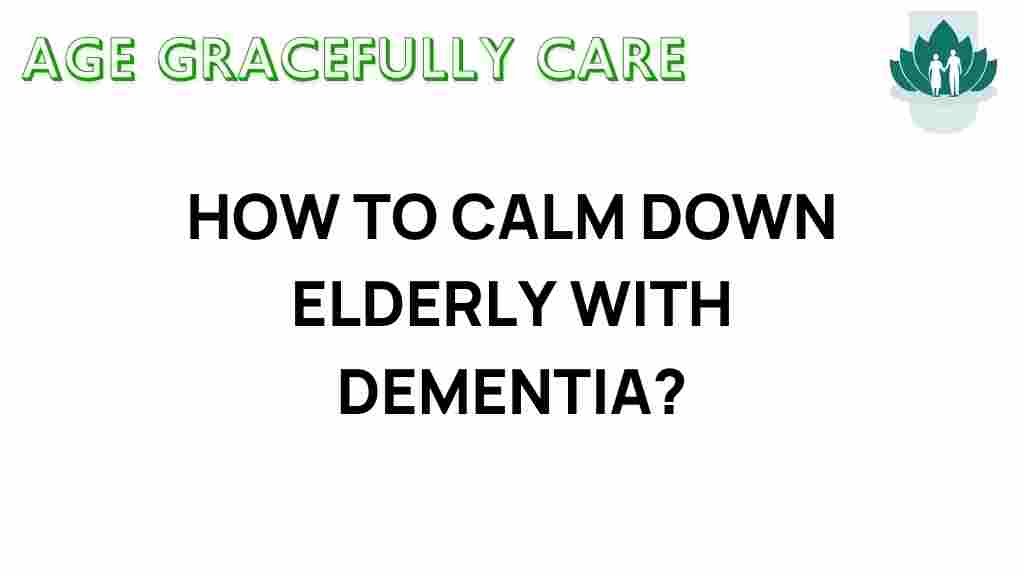Unlocking Serenity: How to Calm Down Elderly with Dementia
Dementia is a complex and often distressing condition that affects millions of elderly individuals worldwide. As caregivers, understanding how to provide emotional support and implement calming techniques can significantly enhance the quality of life for those living with dementia. This article will explore various strategies for caregivers that promote senior wellness and compassionate care, ensuring a serene environment for both the elderly and their loved ones.
Understanding Dementia and Its Impact on Elderly Care
Dementia is not a specific disease but a general term that encompasses various cognitive impairments, including memory loss, communication problems, and changes in behavior. The elderly population is particularly vulnerable to dementia, which can lead to feelings of confusion, anxiety, and agitation. These emotional challenges can be overwhelming, not only for the individuals affected but also for caregivers who strive to provide the best possible support.
Effective elderly care requires a multifaceted approach that includes:
- Effective communication strategies to foster understanding.
- Calming techniques to reduce anxiety and agitation.
- Emotional support that recognizes the individual’s feelings and needs.
- Creating a peaceful environment that promotes mental health.
Step-by-Step Process for Calming Techniques
Implementing calming techniques involves a range of strategies tailored to meet the specific needs of elderly individuals with dementia. Here’s a step-by-step guide that caregivers can follow:
1. Create a Calm Environment
The physical environment plays a crucial role in the emotional well-being of those with dementia. To create a calming atmosphere:
- Reduce noise and distractions.
- Use soft lighting to create a soothing ambiance.
- Incorporate familiar objects or photos that evoke positive memories.
- Ensure comfortable seating and temperature control.
2. Use Gentle Touch and Reassurance
Physical touch can be incredibly soothing for elderly individuals with dementia. Gentle hand-holding or a light massage can provide comfort and help alleviate feelings of anxiety. Always ask for permission and observe their reactions:
- Use a calm voice to offer reassurance.
- Be patient and understanding, recognizing their feelings.
- Provide positive affirmations to build their confidence.
3. Engage in Mindfulness and Relaxation Techniques
Mindfulness practices can help individuals with dementia reconnect with the present moment. Techniques may include:
- Breathing exercises: Encourage slow, deep breaths to promote relaxation.
- Guided imagery: Use calming visualizations to help them focus on peaceful scenes.
- Music therapy: Play soothing music that they enjoy to create a calming atmosphere.
4. Implement Structured Activities
Routine and structure can provide a sense of security for elderly individuals with dementia. Consider implementing daily activities that they enjoy:
- Gardening or simple crafts.
- Reading familiar stories or poems.
- Participating in light exercises or stretching.
5. Effective Communication Strategies
Clear communication is essential in elderly care, especially for those with dementia. Here are some strategies to enhance communication:
- Use short, simple sentences.
- Maintain eye contact and use nonverbal cues.
- Be patient and give them time to respond.
- Repeat information if necessary without showing frustration.
Troubleshooting Common Challenges
Even with the best intentions, caregivers may encounter challenges while trying to calm individuals with dementia. Here are some troubleshooting tips:
1. Addressing Agitation
If agitation arises, consider the following steps:
- Identify triggers—understand what may have caused the agitation.
- Redirect their attention to a calming activity.
- Take a break if necessary; sometimes stepping away can help.
2. Managing Communication Breakdowns
When communication becomes difficult, try these strategies:
- Use visual aids or gestures to convey messages.
- Stay calm and composed; your demeanor can influence their reactions.
- Seek assistance from other caregivers or family members if needed.
3. Recognizing When Professional Help is Needed
Sometimes, professional intervention may be required. Signs that you may need additional support include:
- Increased confusion or distress that doesn’t improve.
- Changes in physical health or appetite.
- Difficulty managing daily care routines.
In such cases, consider reaching out to a healthcare provider or a dementia support organization for guidance. For additional resources, visit Alzheimer’s Association.
Conclusion
Calming techniques and compassionate care are essential components of supporting elderly individuals with dementia. By creating a serene environment, utilizing effective communication strategies, and implementing structured activities, caregivers can significantly enhance the emotional well-being of their loved ones. Remember, patience and understanding go a long way in providing the emotional support that those with dementia need.
By embracing these approaches, caregivers can help unlock serenity for the elderly, fostering a more peaceful and fulfilling life for everyone involved. For further reading on enhancing senior wellness, check out our article on senior care strategies.
This article is in the category Care and created by AgeGracefullyCare Team
